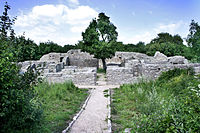Bartholomew le Gros
| Bartholomew le Gros | |
|---|---|
| Bishop of Pécs | |

Ruins of the Saint James Hill Monastery founded by Bishop Bartholomew
|
|
| Province | Esztergom |
| Diocese | Pécs |
| Appointed | 1219 |
| Term ended | 1251 |
| Predecessor | Kalán |
| Successor | Achilles |
| Personal details | |
| Born | before 1189 |
| Died | after 1253 |
| Nationality | French |
| Denomination | Roman Catholic |
Bartholomew le Gros or Bartholomew Grossus (Hungarian: Gros Bertalan pécsi püspök) was a prelate of French origin in the Kingdom of Hungary in the 13th century. He left his homeland for Hungary in the retinue of Yolanda de Courtenay, queen of Andrew II of Hungary in 1216 or 1217. Bartholomew was bishop of Pécs between 1219 and 1251, but he spent a significant part of this period on diplomatic missions. He returned to his family estates in 1247 and resigned from the bishopric some year before his death around 1254.
Bartholomew was the third son of Henri le Gros, lord of Brancion and Uxelles in Burgundy by his wife, Beatrix of Vignory. A younger son, Bartholomew was dedicated to ecclesiastical carrier. He escorted Yolande de Courtaney, bride to King Andrew II of Hungary to her new homeland at the turn of 1216 and 1217.
King Andrew II appointed Bartholomew bishop of Pécs in 1219 after the death of Bishop Kalán. The canons of the cathedral chapter of Pécs attempted to prevent Bartholomew's installation by stating that he was too young for this position, but an official inquiry ordered by the Holy See ascertained that the new bishop had already attained 30 years, the age required by canon law. The same inquiry, however, revealed that Bartholomew's education was imperfect, so the pope ordered him to employ a magister until improving his knowledge. Bartholomew fulfilled this requirement in two years.
"Bishop Bartholomew, bishop of Pécs, seeing the destruction of the army and noticing that some Tatars were attacking the army and torching the camp at several points, took to flight with many of his warriors, similarly not by the highway but across the fields. When some Tatars sent their horses at full gallop after them, ispán Ladislas, who was hastening to the king with his troop under unfurled flags, suddenly came upon them, knowing nothing of what had happened. The bishop, recognizing the Hungarian flags, turned to the ispán, and the Tatars, noticing the great numbers, retreated and pursued others. Thus the bishop, departing together with the ispán, escaped from their hands."
...
Wikipedia
